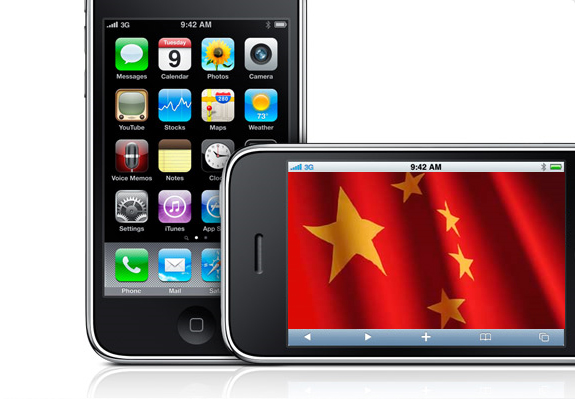In China, Apple enters crowded mobile market

Apple has nearly cleared the hurdles to begin selling its popular iPhone handset in China, one of the last major phone markets Apple has yet to enter, according to the Wall Street Journal.
As many Americans know, the iPhone is Apple's fastest-growing product. But it's done remarkably better in the U.S. than overseas, where it has the home-court advantage and weaker competition.
Overseas, though, Apple's just one of the pack. The iPhone has struggled in overseas markets, where it has faces more competition from rivals such as Nokia, the world's largest mobile phone maker.
Will China extend Apple's reign as a mobile powerhouse?
Or will the venture prove that Apple's magic doesn't translate?
The potential for the iPhone's success in China is clear: the nation is the world's largest mobile market, with some 687 million subscribers. That compares to more than 270 million subscribers in the U.S.
While Apple clears legal hurdles, however, it has many more to come on the sales floor, where the company has an underdog position it's not used to in the U.S.
Apple may have succeeded in the U.S. thanks to a combination of brand popularity and being first on the market with a user-friendly smartphone, but now that the smartphone is ubiquitous, markets are much harder to crack.
The Journal reports:
The iPhone hasn't sold as well in some markets as in the U.S. In Japan, for example, the Apple brand isn't as strong, and regular mobile phones offer many of the same features.
In China, however, touch screens are hot, and there are already a number of popular models that have no keypads. The Apple name has value as a status symbol, and Internet usage through cellphones is increasing.
Apple faces several challenges, namely the rampant knockoff market that in many ways produces derivative products that are as good or better than the original. Now that those products are popular, Apple now must convince consumers that the premium on the original is worth the extra money.
Worse, the Apple brand doesn't quite carry in China the way it does in North America. According to the Journal, Apple has less than 1 percent market share in PC shipments in China, or about 36,000 units out of 11.7 million PCs, according to IDC figures.
A final hurdle is adjusting to the pre-pay market that's popular everywhere but in the U.S. Apple seems to have managed this fairly well in Europe, where 25 percent of iPhone sales originate, but it's not nearly as successful as the 49 percent of sales that come from the U.S.
Fascinatingly, the Chinese campaign will expose just how well Apple can navigate the difficulties of a more open marketplace that has more options and a telecom setup that offers more choice, in that it doesn't lock a customer down for two years with an exclusive, one-carrier-only deal (Apple plans to strike a deal with China Unicom, a state-owned carrier that's the second-largest in that nation.)
Meanwhile, it will also show how well Apple can leverage its closed, iPhone-to-iTunes-to-App Store system in a marketplace in which it doesn't have a sizeable head start versus phones based on Google's Android platform, expected to arrive at market around the same time as the iPhone, and a rumored Dell smartphone, also alleged to arrive to market in a year's time.
Make no mistake, the Chinese move by Apple is a smart one, and will provide ample revenue for the company thanks to the sheer breadth of subscribers in the country. But it remains to be seen whether Apple can achieve dominance in a mobile marketplace that is already quite crowded...at a time when the iPhone as a status symbol is fading.
